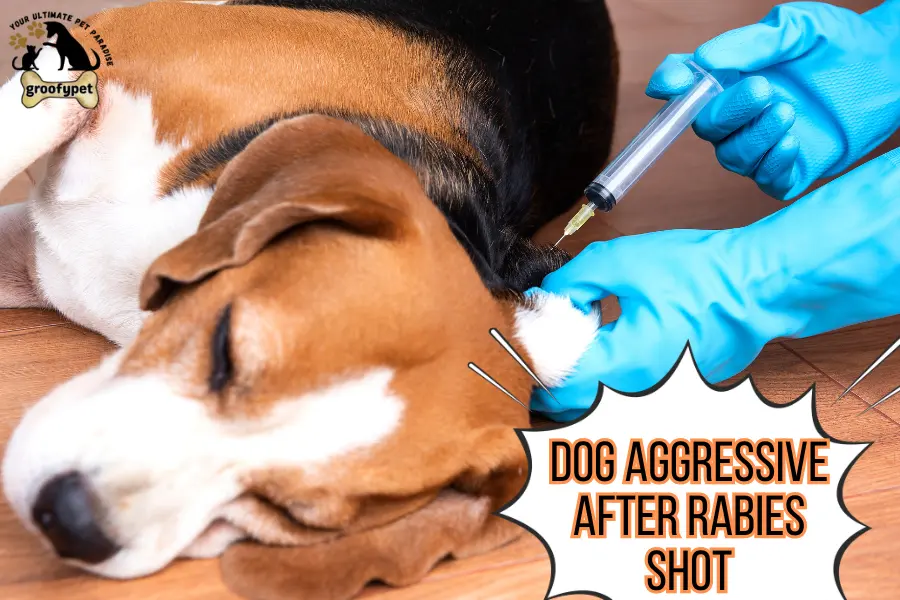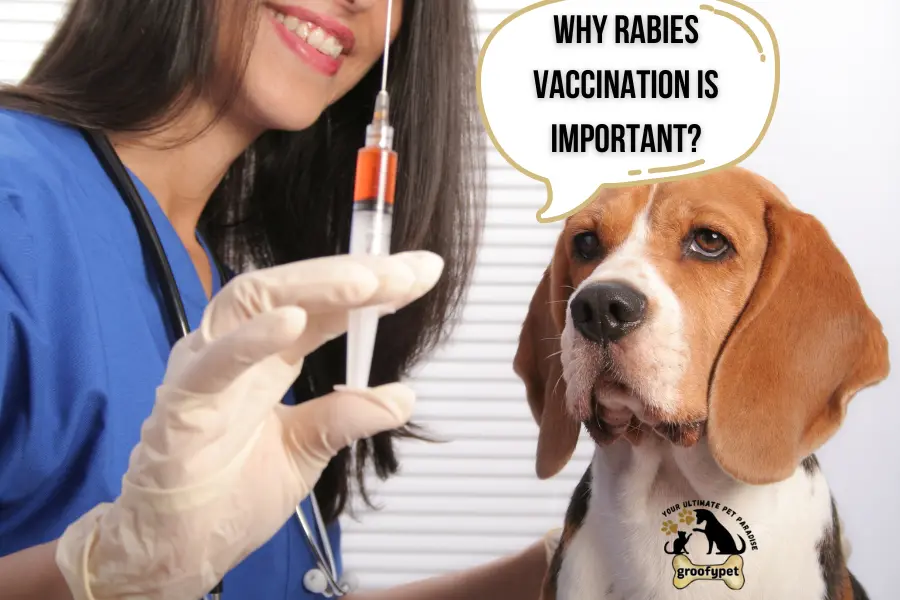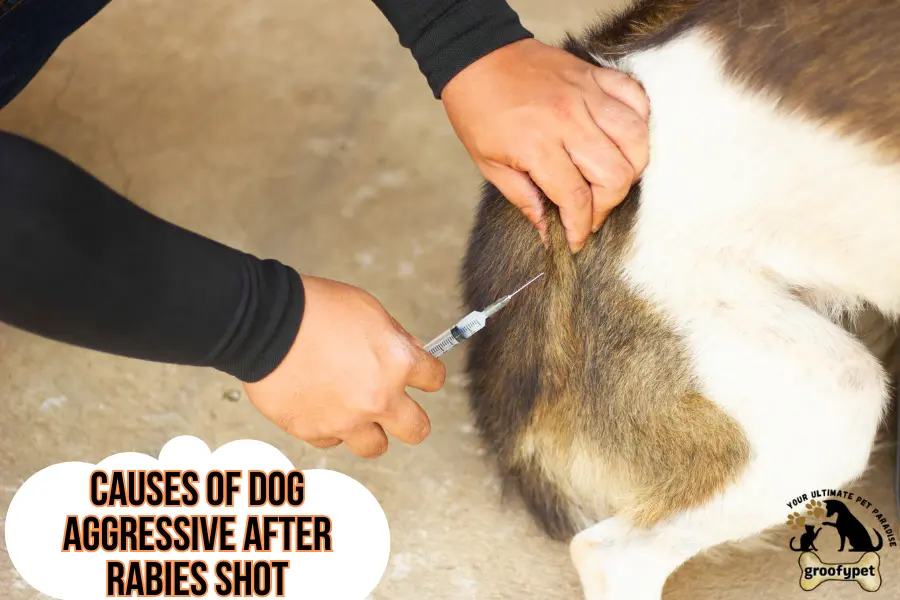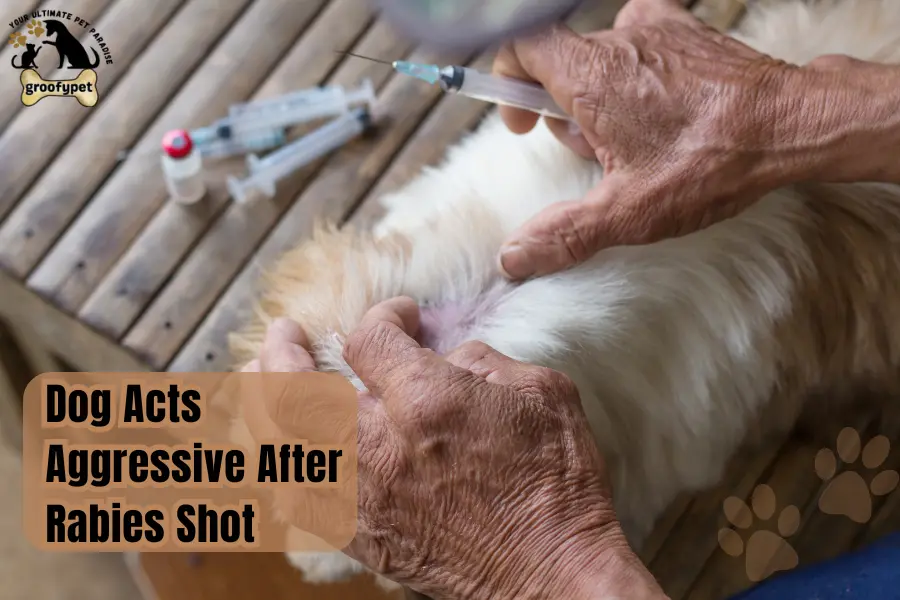Vaccination is essential for both pets and humans from dangerous diseases like rabies. Mostly dog aggressive after rabies shot. Some dogs show unusual behavior after receiving their shots. Among these reactions, aggression and increased reactivity are some of the more alarming concerns.

This has led to the emergence of theories like “rabies vaccinosis” and the broader concept of “rabies miasm,” suggesting a possible connection between vaccines and behavioral changes. However veterinary experts generally view these occurrences as rare and temporary, emphasizing that most dogs recover quickly without lasting effects.
In this article, we will explore the potential behavioral shifts seen in dogs post-rabies vaccination, delve into the scientific and anecdotal evidence behind the “rabies miasm” theory, and offer practical recommendations for dog owners to ensure their pets remain safe and healthy during and after vaccination.
- Rabies vaccination is deemed essential for dogs but may stimulate rabid, vicious behavior at times.
- The potential causes include pain, discomfort, stress, and anxiety stemming from the vaccination.
- Factors that can lead to post-vaccination aggression include age, breed, and previous experiences.
- Safety precautions and positive reinforcement training can help manage aggressive behavior.
- Seeking professional help is recommended when aggression is severe or worsening.
- Knowing Your Rabies Shots for Dogs
In addition to this, make sure that the dog does not fall victim to rabies. Shots for rabies are not something to be done just for good measure; in most countries, they are legally required. Knowing why such shots are necessary and what side effects they may have helps you take better care of your dog.
Table of Contents
ToggleWhy Rabies Vaccination is Important?
Most side effects from rabies shots are mild and don’t last long. If You’re worried talk to your vet. The importance of rabies vaccine for dogs is greater than the common side effects of rabies shots in canines. Rabies vaccination is an important part of responsible pet ownership.

It protects your dog and your community from this deadly disease. Understanding rabies shots and their side effects helps you make better choices for your dog’s health. This ensures their safety and well-being.
Signs of dog Aggressive After Rabies Shot
Some dogs may act aggressively after getting a rabies shot. This can worry pet owners. It’s important to know about these changes to handle them well.
Dogs might growl at people after a rabies shot. They could growl at their owners, family, or strangers. This shows they’re scared or in pain. Another sign is snapping. Dogs might snap or lunge at people without reason. This sudden change is scary and needs quick action.
- Increased irritability or restlessness
- Avoidance of interaction or affection
- Heightened sensitivity to touch or handling
Not all dogs show aggression signs after a rabies shot. The level of change can vary. Some dogs might just be a bit irritable, while others could be very aggressive. Watching your dog’s behavior is key. Knowing these signs helps you act fast. This keeps your pet and family safe.
Causes of dog aggressive after rabies shot
After a dog gets a rabies shot, they might act differently. This can worry pet owners. It’s important to know why this happens.

1) Pain and Discomfort
Pain and discomfort, and stress and anxiety are big reasons. These factors can make a dog act aggressively after a vaccine. The rabies vaccine can hurt dogs. This pain might make them defensive or aggressive. Dogs that are sensitive might react more strongly. The spot where the shot was given might also hurt. If touched, the dog might get angry.
2) Stress and Anxiety
Getting a vaccine can stress out dogs. The new place, the vet, and the shot itself can make them anxious. This anxiety can lead to aggressive behaviour.
Understanding why dogs act aggressively after a vaccine is key. It helps us find ways to stop this behavior.
Factors Contributing to Aggression
Several factors can make the dog more aggressive after a rabies shot. A dog’s age, breed, and past experiences are key. These can greatly affect how they behave after getting vaccinated.
Age and Breed
Young dogs, especially those under 2 might become aggressive after a rabies shot. Their immune systems and emotional maturity are still growing. This makes them more sensitive to the shot’s side effects.
Certain breeds act aggressively after a rabies shot. Research shows that Pit Bulls, Rottweilers and German Shepherds are at higher risk because of their genetics.
Past Experiences
A dog’s past can also influence their reaction to a rabies shot. Dogs with a history of trauma or negative vet experiences might become aggressive. The shot can bring up old fears or discomfort, leading to a defensive or aggressive response.
| Dog Breed | Aggression Likelihood After Rabies Shot |
| Pit Bull | High |
| Rottweiler | High |
| German Shepherd | High |
| Labrador Retriever | Low |
| Golden Retriever | Low |
How to Manage Aggressive Behavior in Dog
Dealing with aggressive behavior in dogs after a rabies shot can be difficult. But with the right steps pet owners can handle it well. Safety tips and positive training are key strategies to use effectively.
Safety Precautions
- When your dog acts aggressively, safety comes first.
- Move slowly and avoid eye contact.
- Speak calmly and don’t scold them.
- This helps keep everyone safe.
- Creating a safe space is also important.
- If the behavior doesn’t stop, get help from a pro.
Positive Reinforcement Training
- Positive training is great for managing aggression in dogs after a rabies shot.
- It rewards good behavior instead of punishing bad ones.
- Use treats and praise to help your dog feel better and more confident.
Here are some positive training tips:
Desensitization and counterconditioning: Gradually expose your dog to triggers while rewarding them.
Impulse control exercises: Teach your dog to stay calm in difficult situations.
Socialization: Introduce your dog to new people and places to feel more comfortable.
Working with a trained animal behaviorist or trainer is important. They offer personalized advice to keep you and your dog safe.
Dog Acts Aggressive After Rabies Shot
Many pet owners worry when their dogs act aggressively after a rabies shot. This behavior makes them puzzled and upset But knowing why it happens can help owners deal with it better. The reasons why some dogs become aggressive after rabies shots are complex.

Pain from the shot can make a dog defensive. The stress of the vet visit and the vaccine’s feeling can also cause aggression. Some dog breeds and ages might be more likely to act aggressively after shots. Young puppies and older dogs might feel the vaccine’s effects more strongly. This can make them more emotional.
To manage aggressive behavior after a rabies shot owners should watch their pets closely. They should create a calm space and use positive training. Sometimes vet behaviorist can help to make a special plan.Understanding why dogs act aggressively after shots helps owners help them. By taking steps to address this, pets can get through the post-shot period safely. With the right steps, dogs can go back to being their friendly selves.
| Safety Precautions | Positive Reinforcement Training |
|
|
Understanding Vaccine Reactions
Vaccines which are necessary for preventing serious disease can sometimes cause a range of reactions in dogs. Understanding these responses, both common and rare, helps owners better navigate the post-vaccination period.
Common Reactions to Vaccination
After receiving a rabies vaccine shot dogs often experience mild and short-lived reactions. These responses are generally considered normal as the body adapts to the vaccine which protects the immune system to build protection against harmful diseases.
1-Mild Symptoms
The most common reactions are minor and temporary, including lethargy, where the dog might seem more tired than usual, a decrease in appetite, and mild discomfort or swelling at the injection site. These symptoms typically resolve within one to two days without requiring special attention from the owner.
2-Severe Reactions
Some dogs may suffer from severe allergic reactions like anaphylaxis, which can present through symptoms such as facial swelling, vomiting or difficulty in breathing. If such reactions occur immediate veterinary care is important.
Understanding the range of potential vaccine reactions from mild to severe prepares dog owners to identify normal post-vaccination behavior. The next section will explore how behavioral changes, such as increased aggression, may also appear after vaccinations.
Behavioral Changes after Rabies Shot
Following vaccination, some dogs may display unexpected behavioral shifts raising concerns among pet owners. Among these changes, aggression and reactivity are the most troubling, although they are generally rare and temporary.
Aggression and Reactivity
Reports suggest that some dogs become more fearful, anxious or even aggressive after receiving vaccinations. This behavioral shift is often leading to low-grade brain inflammation, a possible side effect of the vaccine that can impact the dog’s mood and behavior. While these cases are uncommon dogs display increased nervousness or defensive behaviors, potentially leading to aggressive behavior.
Rabies Vaccinosis
This term is used to describe a condition in which a dog shows symptoms resembling rabies after vaccination. These can include heightened aggression, nervous energy, or destructive behaviours. However “rabies vaccinosis” is largely anecdotal and not widely recognized within the veterinary community. The symptoms typically subside over time, and most veterinarians believe that these reactions are not directly caused by the vaccine itself.
While behavioral changes can occur they are generally short-lived. Monitoring your dog’s behavior closely during the post-vaccination period is crucial for addressing any prolonged issues.
Rabies Miasm Concept
The rabies miasm is a theory that has grabbed attention about post-vaccination behavior in dogs, particularly aggression. Though not universally accepted in the veterinary field, it proposes that certain dogs may develop aggressive tendencies or other behavioral problems following a rabies vaccine due to neurotoxic effects.
Veterinary Opinions after Rabies Shot
- The majority of veterinarians say that there is no authentic scientific proof linking rabies
- vaccinations to long-term aggressive behavior.
- Many experts believe that some dogs show temporary changes in behavior post-vaccination.
- These reactions are typically short-term and do not indicate a direct cause-effect relationship between the vaccine and aggression.
- Veterinarians often emphasize that vaccines are designed to prevent life-threatening diseases, and any adverse reactions are rare.
Despite the debate surrounding rabies miasm, understanding the different perspectives can help owners make informed decisions about their pet’s health.
Monitoring Post-Vaccination Behavior
- After vaccination, it is essential to observe your dog for any unusual signs, especially aggression or increased fearfulness.
- While most side effects including mild lethargy or discomfort resolve within 2 days.
- Owners should seek veterinary advice if aggression persists beyond a few days or worsens over time. Behavioral shifts are typically temporary but close observation can help to identify if further steps are needed.
- Each dog may react differently to vaccinations so understanding your pet’s individual sensitivities is important.
- Pet owners should discuss any previous vaccine reactions with their veterinarian.
By staying informed and proactive, owners can help their pets navigate the vaccination process with minimal discomfort and ensure their safety during these important preventive measures.
Frequently Asked Questions
What are the possible side effects of rabies vaccination in dogs?
Rabies shots can lead to slight side effects in dogs. These consist of pain, discomfort, or even temporary changes in the behavior of dogs. However, these side effects are generally mild and go away within several days.
Why is the vaccination of rabies for dogs necessary?
Rabies is a lethal virus that can be transmitted to human beings as well as pets. The key to prevention is rabies vaccination of dogs, which is necessary to protect their health and halt the gradual spread of the disease.
What are the signs of aggressive behavior in dogs after a rabies shot?
Anger caused by a rabies shot usually appears in the form of growling, snapping, and darting mood swings. Offensive displays like dogs’ being on the defensive also take place.
What library makes aggressive behavior in dogs after a rabies shot?
Aggression from rabies shots may be linked to pain, discomfort, stress, or anxiety.
Final Thoughts
Strong evidence suggesting a link between rabies vaccinations and increased aggression in dogs. The concept of rabies miasm adds complexity to the discussion, but it remains a largely unsupported theory in veterinary science. Most opposite behavioral changes, including aggression, are short-lived and not directly caused by the vaccine itself. The best approach for dog owners is to monitor their pets closely following vaccinations and consult a veterinarian if any concerning behaviors arise.
How To Kitten Proof Your Home With Care – 15 Essential Tips
Why Puppy Sleeps in Crate At Night But Not During Day? Powerful Solution!



